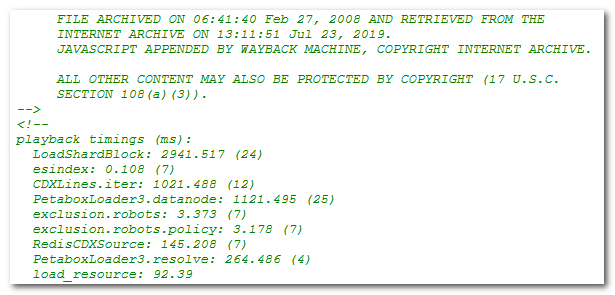Internet Archive and bailiff’s report
[05/08/2019]
For the first time, the Court of Appeal of Paris has acknowledged the admissibility of a bailiff report made from the <archive.org> website, which is dedicated to Internet Archive and also known under the name of “WayBack Machine”.

This service that is managed by the American organization – Internet Archive – crawls thousands of websites every day and captures web pages which can then be freely consulted. The platform was created in 1996 and now lists more than 371 billion web pages (July 2019). In this regard, this is a very popular service for the computer community (OSINT in particular), but also for the legal profession. Indeed, captures allow to see the evolution of a website over time, and to access contents which are sometimes no longer accessible on the original website.
Findings of such captures are regularly submitted as evidence before French courts, and have been often rejected, until this decision of the Court of Appeal of Paris of 5 July 2019.
I. Automated captures of an American company vs standards of bailiff reports on the internet.
As a recall, to be admissible, bailiffs’ reports issued on the Internet must comply with strict standards resulting from abundant case-law.
They must ensure that the capture environment is as neutral as possible, and describe in an accurate manner the conditions of the report:
- Description of used material
- Checking of the date and time of the terminal (synchronization servers)
- Protection from viruses and malwares
- Description of the Internet connexion
- Browser description
- Indication of the IP address (local, public, DNS server)
- Cache clearing before consultation
- Cookie deletion
- Start time
- etc.
This operating mode was standardized by the AFNOR standard NF Z67-147 of September 2010. However, this standard is not binding, and each report has to be appreciated at the discretion of the judge.
On the contrary, Internet Archive captures are mass-produced and automated, without any indication on the conditions of capture. Further, the original source code is altered since the Internet Archive contains comments and footprint:

Extract from the source code of the page http://www.google.com/ archived by Internet Archive on 27/02/2008.
For these reasons, captures from <archive.org> have often been invalidated.
In a judgement of 2 July 2010,[1] the Paris Court of Appeal did not recognize any probative value to the finding made on Archive.org on the grounds that this research tool is not designed for legal use both by its nature and for technical considerations:
- The archiving service is operated by a third party to the proceedings
- Archive.org has no legal authority
- Operating conditions are unknown
- The absence of any interference in archiving a page is not guaranteed.
In a decision of 27 September 2016[2], the same Court dismissed again a finding carried out under similar conditions, on the ground that Archive.org is an archive service [3]operated by an individual without legal authority and which operating conditions are unknown, which does not bring any indisputable probative value to the date of the archived web page, nor to its content.
This position was upheld and clarified on 16 June 2017 by the 1st chamber of the Paris Court of Appeal[4]. On this occasion, the Court rejected the validity of such finding on the grounds that Archive.org was not sued at the instance. More interestingly, in regard to the territorial jurisdiction and the criterion of accessibility, the Court then considered[5] that a capture made and hosted on US servers does not demonstrate access from a computer located in France.
II. Admissibility of captures made on <archive.org> by a French jurisdiction.
In a first instance opposing [6] ALLOPNEUS to CENTRALE PNEUS, the defendant requested that a finding carried out by ALLOPNEUS from the <archive.org> website be excluded from debates on the basis of the previous case-law of the Court of Appeal of Paris :
- org is an archiving service that is operated by a third party to the proceedings.
- org is an entity without legal authority.
- Operating conditions of this service are unknown.
The judges of the first degree rejected such arguments and admitted the validity of the finding due to the failure of the adverse party to demonstrate and produce evidence which may challenge the validity of the finding. The Court considered that the bailiff’s finding complied with the technical prerequisites.
CENTRALE PNEUS appealed and reiterated its request that the finding carried out on archive.org be removed from the proceedings, or declared null and void, or at least that its failure of probative force be acknowledged.
The decision of the 2nd chamber of the Paris Court of Appeal was rendered on 5 July 2019[7]. The position of the judges of first instance on the validity of the report was fully validated:
- The bailiff clearly detailed all the operations performed to obtain screenshots, in accordance with the rules in force.
- All the technical prerequisites on the archive site were met.
- The clause of the content’s non-guarantee on Archive.org does not necessarily challenge the reliability nor the evidential scope of the finding.
Above all, the Court recalled that “the probative value of arguments noted by the bailiff, namely in this case: the pages from an archival website, will be assessed on the merits“, and therefore confirmed the position of the judges on the merits, mentioning thereafter that this finding was valid, due to the failure of the adverse party to demonstrate the nullity.
This position, if it is maintained, would bring French case-law into line with Community case law on patents, as well as with the position of experts in UDRP proceedings.
III. The captures made on Archive.org are regularly used before the OEB and UDRP proceedings.
Litigation before the European Patent Office (EPO / EPO) often relates to issues of prior art. The use of Archive.org is regularly and now widely accepted by the EPO to the point of being directly mentioned in Case Law of the Boards of Appeal, 8th edition, 2016 as to the novelty criteria and the availability to the public:
“The board considered that the fact that a document had been archived by the internet archive on a certain date, naturally barring special circumstances that justified suspicion, usually sufficed by itself to warrant a presumption that the document had been normally accessible to the public on the day of its downloading and made available to the public via the internet archive itself shortly thereafter.”
This consideration, which results from decision T 286/10 of 21 May 2014, has been regularly confirmed since:
- T 1040/14 of 24 April 2017 (see reasons 10)
- T 1711/11 of 9 November 2016 (see reasons 2.2)
- T 2309/11 of 24 April 2017 (see reasons 6)
- T 1066/13 of 9 July 2018 (see reasons 4.2)
In another context, that of domain name disputes, UDRP experts also broadly recognize the use of Archive.org as evidence and consider it as a reference to the service of experts. This is even twice mentioned in WIPO Jurisprudential Overview 3.0 ref:
Point 4.8 : experts may, on their own, refer to Archive.org to assess the historical use of a domain name.
Point 3.11 : the fact, for the administrator of a website, to prevent technically its referencing on Archive.org, can presume of its bad faith.
The decision of the Paris Court of Appeal tends to align with the position of other European courts and the International Court of Arbitration.
The impact is significant for website publishers who have to take into account that the online distribution of their website involves the replication of their contents at different levels (search engine cache, crawling service and automated scraping, CDN, etc …).
Internet Archive is particularly well-known, but there are other websites, such as: Archive IT , Common Crawl or even Archives de l’Internet operated by the BNF.
It remains to be seen if this position will be confirmed in the future.
Paris Court of Appeal
Pole 5 – Chamber 2
[2] Paris Court of Appeal, Pole 5, chamber 1, 27 September 2016 – no 14/18000
[4] Paris Court of Appeal, Pole 1, chamber 8, 16 June 2017 – no 16/06825
[6] Paris Court of First Instance, 3e chamber, 2e section, 27 January 2017 – no 13/09456
[7] Paris Court of Appeal, Pole 5, chamber 2, 05 July 2019 – no 17/03974
The author :
Gaël Mancec | ICT expert
Germain Maureau
gael.mancec@germainmaureau.com
+ 33 (0) 4 72 69 84 30
